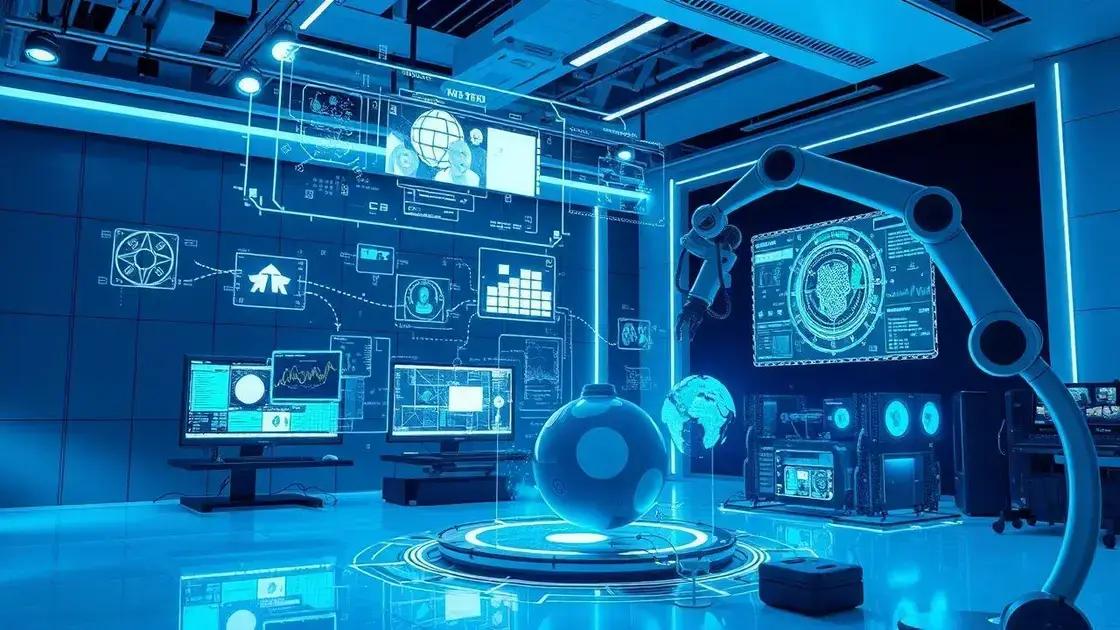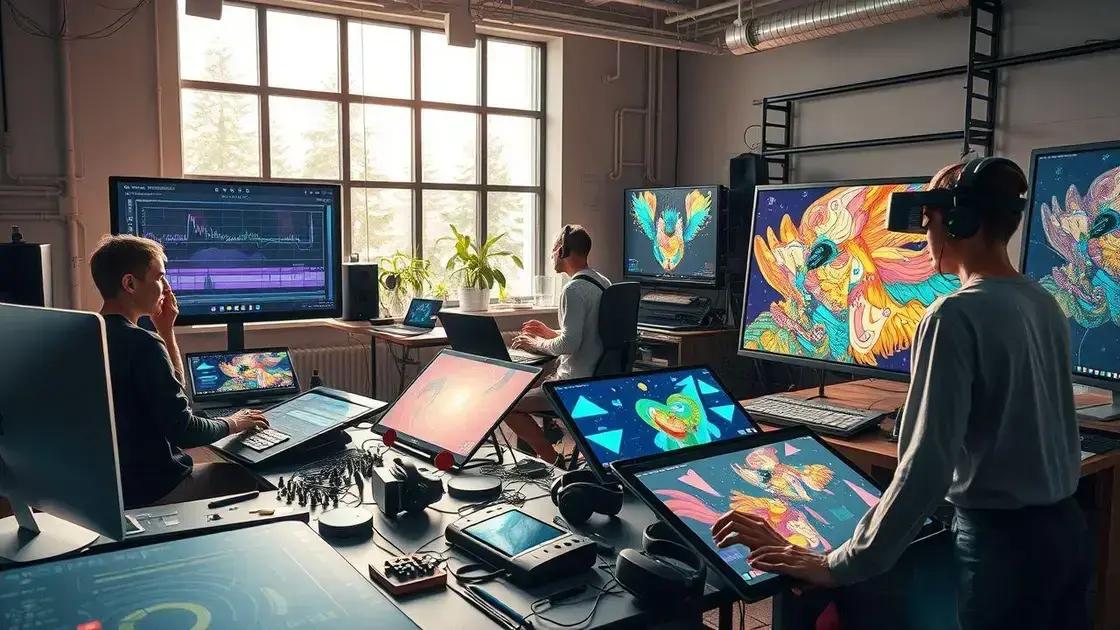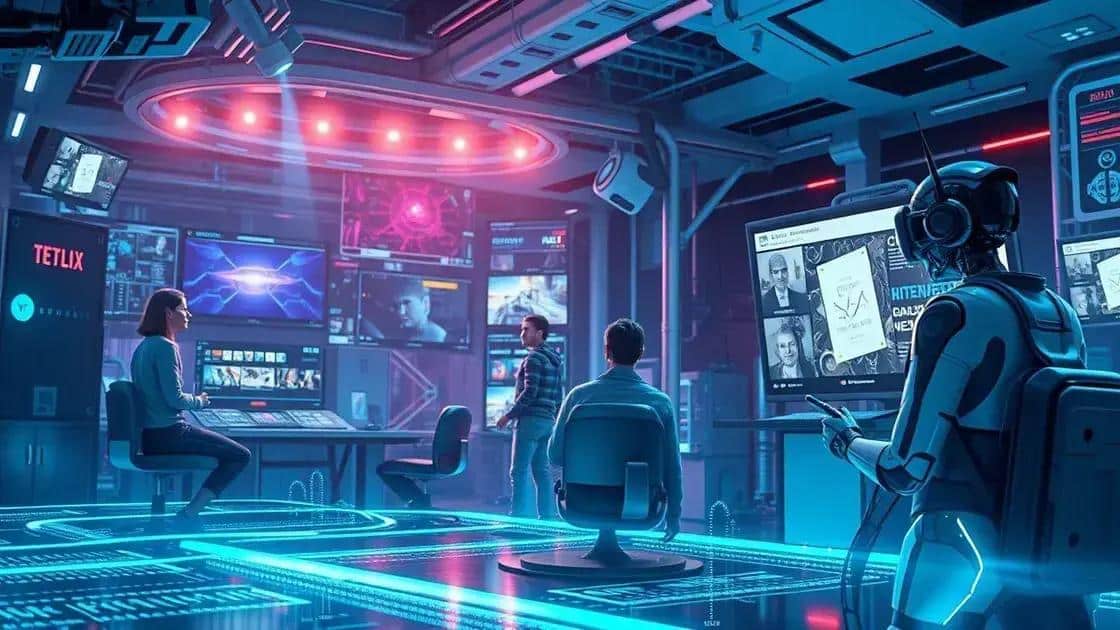AI-generated media trends shaping the future of content

AI-generated media trends are transforming content creation by enhancing user engagement, facilitating personalized experiences, and pushing the boundaries of creative expression through innovative technologies.
AI-generated media trends are reshaping how we experience content today. Have you ever wondered how technology can enhance creativity? This article dives into the innovative changes fueled by AI and their implications for future media.
Emerging technologies in AI-generated media
The landscape of AI-generated media is rapidly evolving, driven by emerging technologies that enhance creativity and productivity. These innovations open new avenues for content creation, making it increasingly accessible to creators worldwide.
Key Technologies Transforming AI Media
Several key technologies are at the forefront of this transformation, each playing a unique role. For example, machine learning algorithms are essential for generating high-quality images, music, and text. Additionally, natural language processing enables more authentic interactions with AI systems.
- Deep Learning: This technology allows AI to learn from vast datasets, improving output quality over time.
- Generative Adversarial Networks (GANs): GANs facilitate the creation of realistic media by having two neural networks compete against each other.
- Emotion Recognition: Understanding emotions helps tailor content to viewer preferences, enhancing engagement.
As these technologies emerge, they push the boundaries of what’s possible in media production. The future may see content created by AI that is indistinguishable from that produced by humans, raising questions about authenticity and originality.
Impact on Creative Processes
With the integration of AI technologies, traditional creative processes are being redefined. Artists and creators can harness AI as a collaborative tool rather than a replacement. This shift encourages exploration and experimentation, leading to innovative outcomes.
AI-generated media is also democratizing content creation, allowing individuals without formal training to produce high-quality media. Anyone can utilize user-friendly AI tools to experiment and share their ideas. This accessibility is fostering a new generation of creators.
- Greater accessibility to media tools.
- Potential for innovative collaborative projects.
- Encouragement of diverse voices and styles in media.
As we look ahead, the interplay between human creativity and AI-generated media will continue to shape the future of artistic expression. Understanding these technologies helps creators leverage them effectively while navigating the complexities they introduce into the creative landscape.
Impact of AI on creative processes

The impact of AI on creative processes is profound, changing how artists and creators approach their work. This technology can streamline tasks and inspire new ideas, taking creativity to new heights.
How AI Enhances Creativity
AI can function as a powerful tool for creators. By automating repetitive tasks, AI allows artists to focus on what they do best—creating. For instance, AI can help in generating music, writing scripts, or even designing graphics.
- Idea Generation: AI can suggest themes or concepts, sparking inspiration.
- Collaboration: Tools like AI writing assistants make it easier to work together.
- Personalization: Creators can tailor their work to audience preferences based on data insights.
These advancements are making creative fields more collaborative, allowing professionals and AI to work side by side. Rather than replacing human creativity, AI supports and amplifies it, leading to exciting new art forms.
Challenges and Considerations
While the potential of AI in creativity is impressive, there are challenges to address. Questions about originality and copyright arise as AI-generated content becomes more common. Many wonder where the line is drawn between human input and AI contributions.
Ethical considerations also play a key role. Ensuring that AI tools are used responsibly is crucial for maintaining the integrity of creative work. These challenges prompt ongoing discussions in the creative community about the role of technology and human creativity.
- Understanding copyright laws related to AI.
- Ensuring ethical use of AI in creative processes.
- Balancing human intuition with AI capabilities.
As we embrace the future of creativity, the impact of AI on creative processes will continue to evolve, offering new ways for artists to express themselves and connect with audiences.
Ethical considerations in AI-generated content
When exploring ethical considerations in AI-generated content, it is vital to address how technology interacts with creativity and ownership. As AI tools develop, they raise important questions about authorship and the impact on industries.
Ownership and Copyright Issues
One major concern is who owns the content produced by AI. Is it the creator of the AI, the user, or does it belong to no one? This uncertainty can complicate copyright laws, making it essential for stakeholders to understand their rights.
- Authorship Rights: Determining if AI-generated pieces can be copyrighted.
- Fair Use: Understanding how AI can create content from existing works.
- Licensing Agreements: Establishing agreements to manage the use of AI-generated material.
These ownership questions lead to ongoing debates in creative fields, as artists and companies adapt to a landscape influenced by AI.
Bias and Fairness
Another ethical concern is the potential for bias in AI-generated content. AI systems learn from existing data, which can be biased. If left unchecked, this can lead to skewed representations in media, affecting audience perceptions.
Creating diverse datasets is crucial to prevent bias and ensure fair representation. Additionally, continuous monitoring of AI output is necessary to identify and correct problematic patterns. This creates a more balanced media environment.
- Regular audits of AI systems for bias.
- Diverse input data to support fair representation.
- Engagement with communities to identify biases.
Ethical considerations in AI-generated content require ongoing dialogue among creators, technologists, and ethicists. Through collaboration, the industry can address these challenges and establish frameworks that promote responsible use of AI. By doing so, we can foster innovation while protecting the integrity of creative expression.
Future predictions for AI in media

The future predictions for AI in media suggest a transformative journey for how we create and consume content. As technology advances, it is likely to reshape storytelling, audience engagement, and even the very nature of creativity.
Enhancing User Experience
In the years to come, AI will play a significant role in personalizing user experiences. By analyzing data on individual preferences, AI can recommend content tailored to unique tastes.
- Customized Content: AI can generate personalized recommendations for articles, videos, and music.
- Interactive Storytelling: Users may engage with narratives that adapt based on their choices.
- Predictive Analytics: Creators can anticipate what audiences want, ensuring relevance in their offerings.
This level of engagement not only keeps viewers interested but also fosters loyalty to brands and creators.
Expansion of AI-Driven Content Creation
As AI technology progresses, we can expect even more sophisticated tools for content creation. From scriptwriting to video editing, AI will streamline several aspects of production, freeing artists to focus on higher-level creative tasks.
Tools may emerge that can write entire articles or produce short films, pushing boundaries and redefining creativity. This shift could lead to a greater diversity of voices and ideas in the media landscape.
- New artistic genres driven by AI.
- Collaborative projects between AI and human creators.
- Increased accessibility for amateur creators.
The media landscape could become more vibrant, with AI at the forefront of innovation.
Ethical Frameworks and Regulations
As media becomes increasingly AI-driven, ethical considerations will be essential. Future predictions also indicate that organizations will need to establish guidelines to address copyright, bias, and the authenticity of AI-generated content.
Establishing these frameworks will help protect artists while fostering innovation. Ethical use of AI will support creators in maintaining their integrity and originality.
- Development of standard ethical practices.
- Collaboration among creators, technologists, and legislators.
- Transparency in AI-generated content creation.
As we look to the future, the predictions for AI in media highlight an exciting landscape filled with potential, challenges, and opportunities for creativity and collaboration.
FAQ – Frequently Asked Questions about AI in Media
How can AI enhance content creation?
AI can automate repetitive tasks, provide creative suggestions, and generate content quickly, making the production process more efficient.
What are the ethical concerns regarding AI-generated content?
Key concerns include authorship rights, potential bias in AI outputs, and the need for transparency in how AI is used in media.
How will AI affect audience engagement in media?
AI can analyze viewer preferences to create personalized content, leading to more engaging and relevant media experiences.
What future trends should we expect from AI in the media industry?
We can expect advancements in interactive storytelling, increased collaboration between humans and AI, and a focus on ethical frameworks for responsible use.





